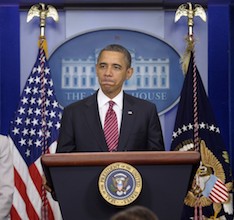Some years ago, Holy Cross Father James Burtchaell published a seminal book entitled The Dying of the Light. The central thesis of this study was that hundreds of universities that began under religious auspices and for religious purposes—the University of Chicago, Princeton, Harvard, Yale, to name just some of the most prominent—have undergone so thorough an erosion of their original identities that now they are utterly secular in orientation. A particularly interesting feature of Burtchaell’s book was his analysis of the slow, subtle process by which the change from fervently religious to blandly secular took place: slight changes, little adjustments, tiny concessions barely noticed at the time, but all of them conducing finally toward the inevitable secularization. The Dying of the Light was meant to be a sobering lesson and a wake-up call to many Catholic universities today, which find themselves on a similar path to compromise.
I won’t follow that part of Burtchaell’s argument now (perhaps another time), but I bring up his book because it sheds a good deal of light on an analogous situation today. Decades ago, priests, religious brothers and religious sisters were colorfully visible features of Catholic hospitals, serving as nurses, chaplains, business officers, and chief administrators. With the decline in vocations, this obviously religious leadership largely disappeared, but Catholic values, for the most part, still animated these institutions. What has begun to concern a number of observers is that, as today’s medical personnel, staffers, and administrators at Catholic hospitals have accommodated themselves more and more to secularist assumptions, even those values are in danger of disappearing. And what exacerbates the situation is that the leaders of many Catholic healthcare facilities feel obligated not to overstress their religious distinctiveness, precisely because they are so reliant upon government funding. In short, the slow but steady creep toward secularization of Catholic healthcare has already been, for some time, a reality. But now the process has been given a massive push by the Obama administration’s recent mandate that all healthcare agencies and institutions must pay for insurance that covers contraception, sterilization, and certain kinds of abortifacient drugs—all of which are repugnant to Catholic teaching.
Here is what is particularly worrisome: the state seems no longer satisfied with a slow but steady evolution toward secularity; it is aggressively forcing Catholic hospitals off the stage, for it is creating for them an impossible situation. If they cave in and provide insurance for these verboten procedures, they have effectively de-Catholicized themselves; and if they refuse to provide such insurance, they will be met with fines of millions of dollars, which they cannot possibly pay. In either case, they are forced out of business as Catholic. And this seems, sadly, to be precisely what the Obama administration wants. At the University of Notre Dame, on the occasion of his receiving (controversially enough) an honorary law degree, President Obama publicly and vociferously pledged that he would provide for a “conscience clause” for those who wanted, for religious reasons, to opt out of a policy they find objectionable. But with this recent mandate, he has utterly gone back on his word.
The secularist state recognizes that its principle enemy is the Church Catholic. Accordingly, it wants Catholicism off the public stage and relegated to a private realm where it cannot interfere with secularism’s totalitarian agenda. I realize that in using that particular term, I’m dropping a rhetorical bomb, but I am not doing so casually. There is a modality of secular liberalism that is not aggressive toward religion, but rather recognizes that religion makes an indispensable contribution to civil society. This more tolerant liberalism allows, not only for freedom of worship, but also for real freedom of religion, which is to say, the expression of religious values in the public square and the free play of religious ideas in the public conversation. Most of our founding fathers advocated just this type of liberalism. But there is another modality of secularism—sadly on display in the current administration—that is actively aggressive toward religion, precisely because it sees religion as its primary rival in the public arena. Appreciating certain moral convictions as disvalues—think here especially of Catholic teachings concerning sexuality—it seeks to eliminate religion or at the very least to privatize and hence marginalize it. In doing so, it indeed reveals itself as totalitarian, for it allows no room in the public space for anything but itself.
The reason that the Bill of Rights—the first ten amendments to the Constitution—is so important is that it holds off the tendency, inherent in any government, toward totalitarianism, even if that means the totalitarianism of the majority. The very first amendment, of course, guarantees the free exercise of religion in our country. Our founders obviously feared that even a democratic system, predicated upon a repudiation of tyranny, could become so tyrannical itself that it would seek to intrude upon the sacred realm of the religious conscience. As Jefferson, Toqueville, Lincoln and many others have seen, our democracy is especially healthy when it disallows a concentration of power—political, economic, or cultural—in any one place. I would hope that American Catholics would argue against the Obama administration move, not only because they are Catholics, but also because they are Americans.
